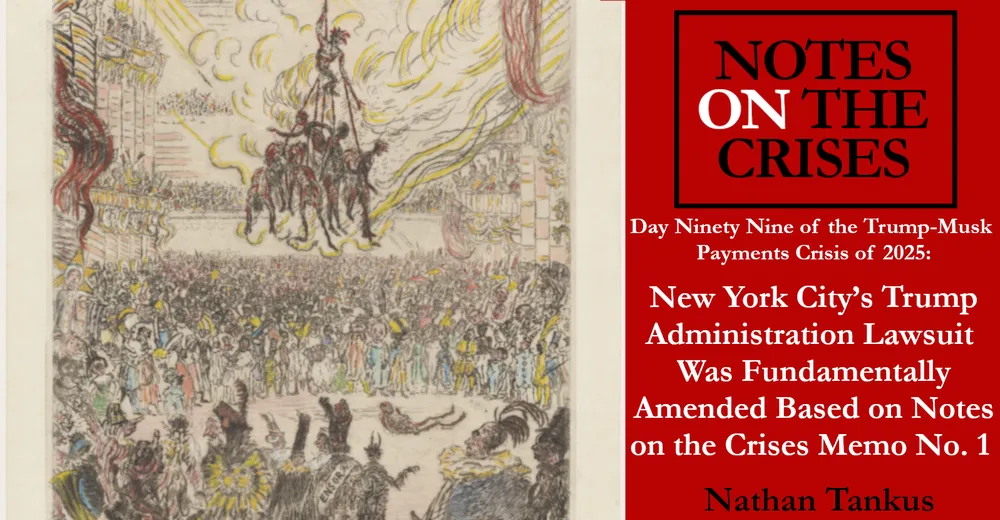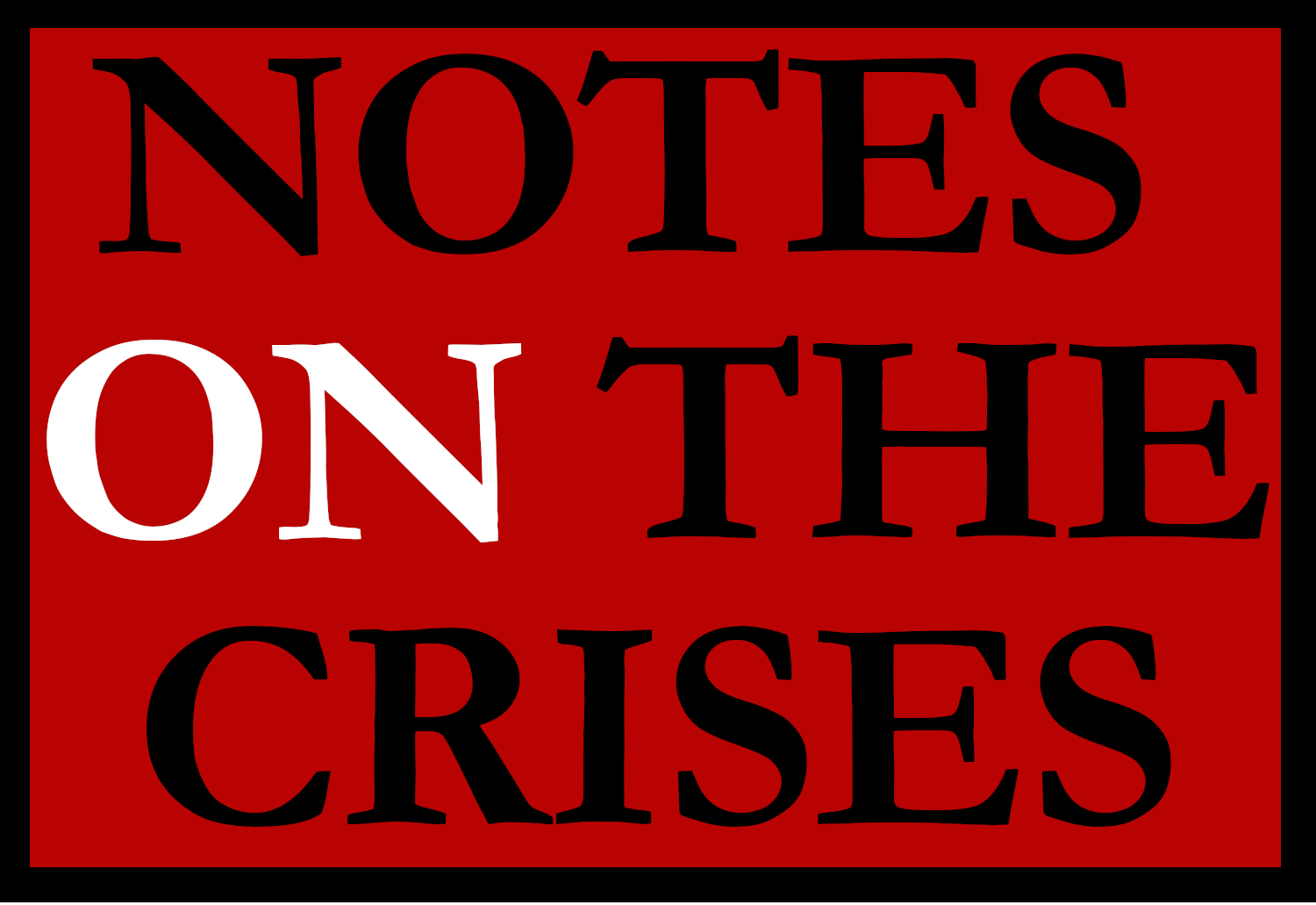New York City’s Trump Administration Lawsuit Was Fundamentally Amended Based on Notes on the Crises Memo No. 1

I have a lot of writing to get out over the next couple of weeks, especially following up on the Trump Tariff Crisis and the Future of the Dollar. I also need to dig back into the state of play at the Bureau of Fiscal Service. Today however, it's important to document signs of the impact Notes on the Crises is already having. One major sign I’ve had my eye on is the impact of my March 13 piece, published simultaneously in this newsletter and Rolling Stone, on New York City’s lawsuit against the Trump administration over its so-called “clawback” of 80.5 million dollars of congressionally appropriated FEMA funds.
Reads might recall that starting with that piece Notes on the Crises has begun commissioning legal research memos on obscure and technical legal issues. My article two weeks ago about the Social Security Administration’s “Death Master File” was accompanied by a memo on the legal rules related to the so-called “Reclamation of Social Security Benefits”. I plan on continuing to commission legal research memos when I think it's relevant or important to my reporting and the issue at hand.
That first memo by Ashley Burke, on the “Federal Government Use of the Automated Clearing House System”, was far more important than I emphasized at the time. As far as anyone I know is aware, that memo is the only publicly available memo on the topic. To understand how that could possibly be true, it's important to take a step back and talk more abstractly about how “law” is organized.
At a fundamental level, law is the daily set of practices a variety of actors- both lawyers and non-lawyers alike- engage in that are either subject to, or consciously withdrawn from, formal dispute resolution. That’s a careful, dare I say lawyerly, definition. So let's break this down. We all engage in legal practices every day. Even not littering is a kind of legal practice insofar as we are doing it to avoid getting a ticket- i.e. incurring a legal liability. There are also a variety of ways that legal liabilities- both criminal and civil- are both created, disputed and resolved. The most obvious one is a judicial court- think the end of every Law & Order episode.
There are, however, all sorts of courts. There are administrative law courts which handle cases under a government agency’s jurisdiction. There are also forms of “dispute resolution” which are not handled by courts at all. There is arbitration- nowadays regularly made mandatory for consumers by corporations when buying their products. There is also mediation negotiation and conciliation whose purposes are to create agreement and avoid adjudication. While we all engage in legal practices lawyers, by virtue of their government issued licenses, are privileged legal actors in the legal system.
The point of clarifying this is to bring readers along to help see things from the “lawyer” point of view. While lawyers are privileged relative to the rest of us, they all have “the same” license. So what gives one advantage over another? You could say education, skill or knowledge. You could say their rhetorical skills in the courtroom or in negotiations. There is truth to all of this. But one of the most important, and most underemphasized, is the value of experience regarding confidential matters. More specifically, their confidential legal memos accumulated over years- maybe even decades. If all of the internal legal memos- and copies of confidential legal documents from other cases- were suddenly published online for free from the archives of all the biggest law firms in the world, the value these firms provide their clients would be devastated.
Which brings me back to Notes on the Crises Legal Research Memorandum No.1. That memo was the first public memo documenting the legal rules that define how the federal government engages the Automated Clearing House system because any other memo which documents these issues are buried in the files of either Federal agencies or the top law firms. Or, of course, the National Automated Clearing House Association (Nacha) which plays a major part in defining the rules. These law firms do best on obscure issues that only they could devote the resources to having expertise on in preparation for a crisis- or even just an unusual event. This pattern played out during the 2008 Great Financial Crisis.
This is, of course, a structural problem in our system. It is, however, a burgeoning crisis in and of itself since the beginning of the second Trump administration. As Trump- and DOGE- throw the federal government into chaos, it also throws government employees' more typical relationship with their own legal counsels into chaos. We are entering a dangerous moment where obscure legal issues are coming to the forefront at the same time that government employees at every level find themselves less able- or willing- to access their traditional sources of legal advice.
I’ve been thinking about this problem since almost the beginning of the crisis and, with my second Rolling Stone article, I saw the opportunity to chart a unique strategy to respond to it. By publishing freely accessible legal research memoranda, I could make sure good information is getting to government employees. It also makes it easier to get legal advice itself. These legal research memos themselves are not, and cannot be, legal advice. However, they can form the basis of official legal opinions of government lawyers. It is also a lot easier to hand a public memo to agency legal counsel and say “what do you think of this?” than to advocate the construction of novel legal theories your lawyers have no familiarity with.
Which finally brings me to the point of this piece. Several weeks ago it came to my attention that New York City’s lawsuit against the Trump administration over the FEMA “clawbacks” had been amended with a wealth of detail about the Automated Clearing House system. While I didn’t have time to look into it, I asked an anonymous lawyer to do so on my behalf. Today I’m publishing the result as Notes on the Crises Legal Research Memorandum No. 3. This memo is about “ACH Amendments to Complaint in City of New York v. Trump (1:25-cv-01510)”.
The memo is 7 pages, but for those who are uninterested in the legal detail the takeaway is straightforward and can be summarized by quoting a few paragraphs from the memo itself:
As compared with the initial Complaint—which mentioned ACH only once in reference to the initial deposit of the $80.5 million in the City’s central treasury account—the Amended Complaint discusses ACH at length in nearly every section. The Introduction, Facts, Claims for Relief, and Prayer for Relief all depend on a thorough and detailed understanding of the rules that govern the ACH system to make a case for the return of the $80.5 million to New York City. [...]
Seven days after the publication of NOTC Memo No. 1, the City filed an Amended Complaint containing a nuanced legal theory based on the rules and regulations that govern the federal government’s use of the ACH system. It is possible that Hamilton’s reference to the ACH reversal in his February 28, 2025 Declaration spurred the City to independently research 31 C.F.R Part 210 and the Nacha Rules. However, prior to the release of the NOTC Memo, the City had only cited 31 C.F.R. Part 210 once in a footnote.
The federal government’s use of the ACH system is an obscure, complicated topic. The City’s legal team probably had little to no prior knowledge of this body of law. Moreover, NOTC Memo No. 1 appears to be the first publicly available analysis of the rules that structure the federal government’s use of ACH. Even if the City did not rely entirely on NOTC Memo No. 1 for its ACH research, without the groundwork laid by the memo, the City might not have been willing or able to devote the resources needed to craft the sophisticated ACH-related arguments that now reinforce the Claims for Relief in the Amended Complaint.” [emphasis added]
In short, the very first legal research memo Notes on the Crises published had a profound impact on New York City government’s lawsuit of the Trump administration. It's hard to overstate the magnitude of that impact. The legal research in that memo is relevant to- at minimum- thousands of state and local governments and every agency of the federal government. It's also relevant to non-profits and, unfortunately, it's increasingly relevant to individuals. It is also now the “conventional wisdom” among lawyers who are interested in this issue- which means all existing legal memos on this topic will have to be updated to reflect its contents. I’m providing this incredibly impactful legal research for free while raising the alarm about the issue in the press. This extraordinary impact I’ve managed to have has come from a publication that was a “one man” newsletter three months ago- and still primarily is.
As readers have gotten hints of, I’m now in the process of expanding into a fully fledged publication. I have a 2000 square foot office which will become a gathering place for people to help. Paid subscriptions from my 2900 subscribers (and counting) are what have made that possible. I’m pursuing a number of different avenues to gain the revenue I can plow right back into expanding investigative reporting. You will hear about those avenues in greater detail soon. However the foundation of a publication is its paid subscribers. It provides the stability and the reliability needed to make major leaps into the unknown. Thank you to those who are supporting that work, and for those that aren’t- please consider doing so. Much larger entities are doing far less with far more.
Sign up for Notes on the Crises
Currently: Comprehensive coverage of the Trump-Musk Payments Crisis of 2025
